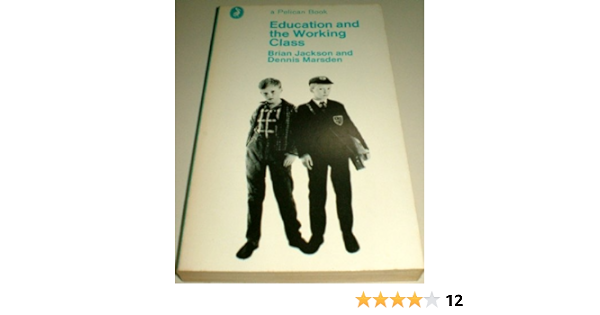I am now five years into my doctorate in education and whilst I delve deeper into piles of journal articles and more obscure texts – it is always useful to go back to the foundational texts that have shaped the field in which I conduct my research. I also hope this will provide a good jumping-off point for those new to the sociology of education, particularly where you have an interest in social class and role it plays.
B. Jackson & D. Marsden (1962). Education and the working class
Education and the Working Class explores the complex relationship between education and the working class in post-World War II Britain. The book delves into the impact of the British education system on the working-class children, shedding light on issues related to class inequalities, social mobility, and educational opportunities. Jackson and Marsden’s research, informed by extensive fieldwork, interviews, and case studies, critically analyses the role of schooling in perpetuating or alleviating social stratification. They argue that the educational system often reflects and reinforces existing class divisions, making it difficult for working-class students to break out of their social circumstances. This thought-provoking work remains relevant today as it continues to inform discussions on the intersection of education and social class.
C. Lacey (1970). Hightown Grammar: The school as a social system
Hightown Grammar: The School as a Social System is a study that offers a deep sociological examination of a British grammar school as a microcosm of wider society. Lacey’s work employs the concept of the school as a social system, exploring the intricate interactions, hierarchies, and power structures within the institution. Through detailed ethnographic research, Lacey uncovers how the school’s culture and practices perpetuate class distinctions and shape the life chances of its students. He highlights the influence of teachers, the hidden curriculum, and the informal norms that contribute to the reproduction of social inequalities. “Hightown Grammar” provides invaluable insights into the dynamics of educational institutions and their role in reinforcing societal hierarchies, contributing to ongoing discussions on education, class, and social mobility.
M. Apple (1979). Ideology and curriculum
This book critically examines the relationship between schooling and the socio-political ideologies that underpin curriculum development. Apple contends that curriculum is not a neutral entity but rather a reflection of societal values and power structures. He argues that educational systems are often influenced by hidden ideological agendas that serve the interests of dominant groups, reinforcing social inequalities. Through a comprehensive analysis of historical and contemporary curriculum practices, Apple underscores how the content and organization of schooling are entwined with larger issues of social control and cultural reproduction. “Ideology and Curriculum” challenges readers to consider the political and ideological dimensions of education and calls for a more critical and equitable approach to curriculum design and implementation, making it a foundational text for those interested in the intersection of education and society.
D. Reay (2017). Miseducation: Inequality, Education and the Working Classes
Reay provides an exploration of the enduring issue of educational inequality faced by working-class students in contemporary society. Reay draws on extensive research and case studies to examine how the British education system continues to disadvantage and marginalize children from working-class backgrounds. She highlights the impact of economic and social disparities on educational opportunities and outcomes, shedding light on the challenges these students encounter, both inside and outside the classroom. Reay’s work underscores the importance of addressing deeply ingrained class-based inequalities within the educational system and advocating for more inclusive and equitable approaches to education. “Miseducation” provides a thought-provoking analysis of class-based disparities in education and offers valuable insights into the ongoing struggle for a fairer and more accessible educational landscape.
P. Bourdieu (1986). Distinction: A social critique of the judgement of taste
Distinction delves into the complex dynamics of social class and culture. Drawing on extensive research conducted in France, Bourdieu investigates how individuals’ preferences in art, music, fashion, and lifestyle choices reflect and perpetuate social hierarchies. He argues that cultural taste is not simply a matter of personal preference but is deeply entwined with one’s social and economic background, shaping one’s identity and social positioning. Bourdieu’s concept of “cultural capital” is central to his analysis, emphasizing how certain forms of cultural knowledge and appreciation are unequally distributed in society, perpetuating class distinctions. “Distinction” is a fundamental text for understanding the intricate interplay between culture, social class, and power, offering profound insights into the ways in which our tastes and preferences are both a reflection of and a contributor to social inequality.
